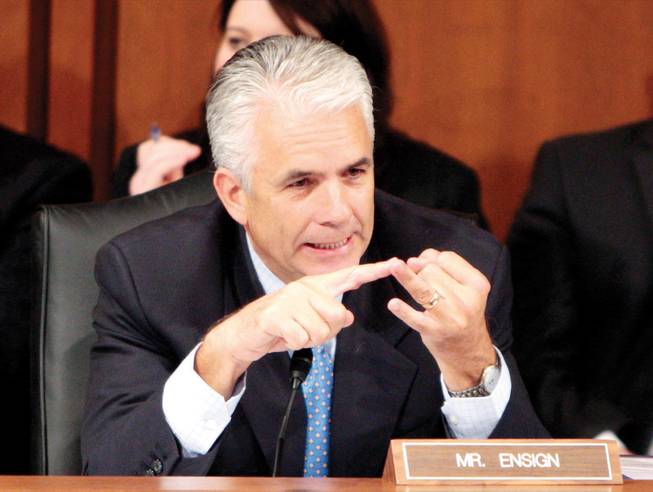
associated press file
Sen. John Ensign, R-Nev., posed the question Tuesday of whether it is constitutional to require U.S. citizens to purchase health insurance.
Wednesday, Dec. 23, 2009 | 2 a.m.
Sun Coverage
- Reid bobs and weaves to land health care deal (12-22-09)
- GOP to keep up its fight until the final deadline (12-22-09)
- Deal-making gets job done, Reid says (12-22-09)
- Obama welcomes ‘historic’ health care advance (12-21-09)
- Jim Gibbons attacks Harry Reid on health care bill (12-21-09)
- Health care bill clears tough Senate test (12-20-2009)
- Health care compromise gives sweet Medicaid deal to Nebraska (12-20-2009)
Republican Sen. John Ensign has inserted a complicated legal question into the health care debate: Can the federal government require Americans to buy health insurance?
The health bill before the Senate would mandate that all Americans carry health insurance policies by 2014, with the government providing subsidies to help low- and middle-income families pay for them.
Those who don’t buy insurance would face fines that rise gradually to $750 — or a maximum of $2,250 per family.
Since when does the government have the right to mandate that you buy something, Ensign said.
It’s similar to the iPod argument that Nevada Republican Rep. Dean Heller used to explain his opposition to the health care mandate months ago. Some people might want to buy health insurance, other people might prefer an iPod, Heller said. It is their choice.
Ensign took that tack Tuesday when he asked for a vote on whether the legislation’s mandate to buy health insurance is constitutional. The vote is scheduled for today.
“If so, what’s next?” Ensign said. “We can simply require Americans to buy certain cars, dishwashers or refrigerators. Where do we draw the line? Or do we draw one at all?”
Constitutional scholars generally agree the proposed mandate would hold up under Supreme Court scrutiny, but they do not deny a robust discussion of the issue is unfolding in legal circles.
“There is certainly a debate going on,” said Eugene Volokh, a professor at UCLA School of Law.
The Constitution provides Congress with broad powers to form a more perfect union, establish justice, provide for the common defense, promote the general welfare and so on.
One of the final lines explaining the power of the legislative branch offers broadly that Congress can make “all laws which shall be necessary and proper” to carry out all the other laws. The Supreme Court in 1819 interpreted this as giving Congress great deference in deciding what it can and cannot do, a ruling that has been upheld many times, Volokh said.
Volokh is tepid toward the health insurance mandate, but he thinks the proposal is constitutional.
“It may be bad policy,” Volokh said. “But I think it’s constitutional.”
The reasoning behind the proposed mandate goes like this: If all Americans are required to buy insurance, the young and healthy, who tend to require less care, will help pay the health care costs of the old and sick, spreading risks that could lead to lower costs overall. Because the United States requires emergency rooms to treat those who show up, regardless of their ability to pay, those who have insurance now see their premiums rise to cover the costs of those who do not.
Proponents of health care reform often compare the proposed mandate to state requirements for drivers to carry automobile insurance.
But Ensign and others say the health insurance mandate is different. States require automobile insurance for the right to drive a car. Health insurance would be required merely for living.
“This would be historic,” said Randy Barnett, a professor at the Georgetown School of Law.
“They’re making a private citizen enter into a contract with a private insurance company,” he said. “Making you do it is a new thing.”
As the health care debate continues, one development is certain. If the legislation passes, legal challenges will follow.

Join the Discussion:
Check this out for a full explanation of our conversion to the LiveFyre commenting system and instructions on how to sign up for an account.
Full comments policy